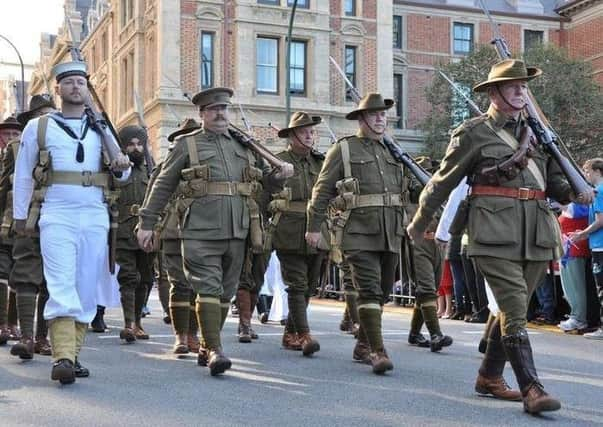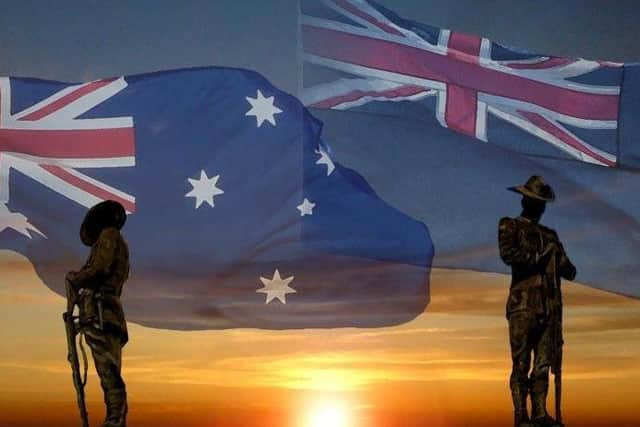Events at Gallipoli viewed both as a tragedy and a source of great pride


For over a century, in the dark hours before daybreak each April 25, Australians and New Zealanders have gathered at dawn vigils to commemorate those who served and died in war.
The memorial day takes place on the anniversary of the landings by Australian and New Zealand troops at Gallipoli – in Turkey – in 1915.
Advertisement
Hide AdAdvertisement
Hide AdThe Anzacs were the Australian and New Zealand Army Corps and this was the first significant military action fought by Australian and New Zealand troops during the Great War.


Australians and New Zealanders alike view Gallipoli both as a tragedy and as a source of great pride. The Anzacs were much admired for their military prowess and courage.
In 1915 Australia had been a nation for only 14 years and New Zealand had only become a dominion in 1907. Gallipoli became an important component of national identity in both countries. The Australian Federal Government’s website states: ‘The spirit of Anzac recognises the qualities of courage, mateship and sacrifice which were demonstrated at the Gallipoli landing.’
In all, about 7,300 Australians and 2,400 New Zealanders lost their lives at Gallipoli.
Advertisement
Hide AdAdvertisement
Hide AdCommemorative services are held at dawn to mark the time of the original Gallipoli landings. Services are held at war memorials across Australia and New Zealand, usually including two minutes of silence, broken by the Last Post, followed by marches of veterans and their families.
One of the traditions of Anzac Day is the ‘gunfire breakfast’ (coffee with rum added) which occurs shortly after the dawn ceremonies and recalls the ‘breakfast’ taken by many soldiers before facing battle.
Gallipoli is often regarded as a missed opportunity which could have shortened the war. Such thinking was (and remains) delusional because the whole operation was flawed from the outset and could never have had any appreciable impact on the real enemy, Germany.
The notion that the Royal Navy would pass through the Dardanelles, bombard Constantinople (now Istanbul) and knock the Ottoman Empire out of the war, which would strengthen Russia and weaken Germany, and shorten the war, relied too heavily on wishful thinking. It failed to take account of at least three important considerations.
Advertisement
Hide AdAdvertisement
Hide AdFirst, Turkey was propped up by Germany rather than the other way round. Secondly, the Ottoman Empire was huge and the proposition that the capture of Constantinople would be enough to knock Turkey out of the war was pretty dubious. Finally, even if a supply route could be opened to Russia, Britain and France lacked sufficient munitions to supply their own armies and had none to spare to send to Russia. The Russian railway system was too primitive for the Russians to send grain to Britain and France (which was another Allied miscalculation).
Nineteenth-century Turkey had been regarded as ‘the sick man of Europe’ and there was a not unreasonable assumption that the defeat of Turkey would be a pushover. Additionally, Turkey’s military performance in the Balkan Wars (1912-13) had been singularly unimpressive. However under the direction of talented German commander, Liman von Sanders, the Turks had embarked on an astonishingly impressive programme of military reforms. By 1915 the Turkish Army was a formidable fighting force. Both its equipment and training were improving all the time. In Mustafa Kemal Atatürk, the 34-year-old commander of the 1st Turkish Division (and creator of modern Turkey), the Turks possessed an outstanding soldier. Furthermore the Turks would also be defending their homeland and would enjoy the advantages of having shorter lines of communication.
Both Sanders and Atatürk had no difficulty in correctly identifying where the Allied landings would take place and organised their defences accordingly.
It is often assumed the major problem with the campaign in Gallipoli was the heat. It was a truly inhospitable place and in the summer months the heat was unbearable.
Advertisement
Hide AdAdvertisement
Hide AdIn the words of the historian Robert Blake: ‘Men sweltered in the daily increasing heat, assailed by huge black swarms of fat flies which had feasted on rotting corpses; they were half choked by the fearful stench, they were short of water, ridden with disease and dysentery, torment by lice. They were not short of food, but a diet of greasy bully beef followed by hard biscuits spread by plum and apple jam was not ideal when the temperature was 100 degrees in the shade, if any shade could be found’.
By contrast, in the winter the peninsula experienced sub-zero temperatures, heavy snow and flash floods. As a result of the great storm of 27-30 November 1915, for example 200 soldiers were drowned and 5,000 were found to be suffering from frostbite.
There were even cases of soldiers freezing to death in their trenches. On 28 November 1915 one junior officer found six men ‘huddled together on a firing step frozen to death’.
If the Allies had been better led and more aggressive, could they have broken through and made Gallipoli a victory? Probably not because the brutal truth is that the quality of leadership did not really matter, except on very rare occasions such as on 25 April 1915 (the date of the landings at Helles and Anzac). Thereafter Gallipoli always came second to the Western Front in France and Flanders – as was bound to be the case – and never received enough men, equipment, ammunition or supplies for success to be possible once the element of surprise had been lost.
Advertisement
Hide AdAdvertisement
Hide AdThe historian Robert Rhodes James supposed Gallipoli ‘ended in a tactical draw’ but ‘considered strategically it was a major defeat for the Allies’.
A Royal Commission under Lord Cromer was appointed in 1916 to investigate the failure of the Gallipoli campaign. Its findings in 1917 concluded that the operation had been ill-conceived and ineptly executed, and losses were not justified.
‘Success in the Dardanelles, if possible, was only possible on condition that the [British] Government concentrated their efforts on the enterprise and limited their expenditure of men and material in the Western theatre of war’. But, as we have already noted, that condition was never likely to be met.